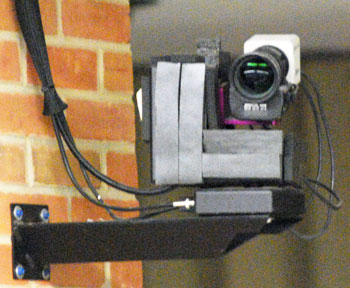Video Privacy Ordinance Postponed Again
Initial consideration of a new ordinance regulating the use of public surveillance cameras has been postponed again – this time until June 17. The council’s action came at its May 20, 2013 meeting. The council had previously postponed the item at its April 15 meeting – due to the length of that meeting – and again at its May 6 meeting. [.pdf of ordinance as presented to the council on April 15, 2013]

The proposed video privacy ordinance would not apply to CTN cameras like this one mounted in the Ann Arbor city council chambers.
The new ordinance would apply only to a limited range of cameras – those used by the city of Ann Arbor “to monitor human activity without the physical presence of an operator, including cameras on remotely operated aerial vehicles.” The ordinance would not apply to a range of city of Ann Arbor cameras, for example: cameras used to improve traffic design, security cameras operating in jails, prisons, water treatment facilities, public housing facilities, or the Ann Arbor Airport and other governmental facilities.
The new ordinance would allow for public surveillance cameras to be installed for 15 days or less at the discretion of the city administrator if the purpose is to address a specific criminal problem.
A period of longer than 15 days would require two-thirds of nearby residents to give written permission. Regardless of the period of the installation, onsite notice of the camera’s presence would be required. If a private residence is in the public surveillance camera’s range, then the residents of that property would have to give written permission for the installation.
A public surveillance camera could not be used for live-monitoring, except in emergencies, and audio recording would not be permitted. Access to the recorded images would be limited to “employees of the police department and attorneys involved in criminal proceedings.” After 90 days, surveillance recordings would be deleted unless they are part of an ongoing investigation. A report on the effectiveness of a camera would be published on a public website after its removal.
The council had been alerted to the forthcoming ordinance proposal nearly four months ago, when Chuck Warpehoski (Ward 5) told his colleagues at their Dec. 20, 2012 meeting that he and wardmate Mike Anglin would be bringing a proposal forward.
At that Dec. 20 meeting, Warpehoski said that the Ann Arbor police department doesn’t currently use that technique, but there’d been some concerns in other communities.
By way of additional background, the ordinance has been long in the works but has been delayed. Former Ward 1 councilmember Sandi Smith had announced at a council meeting over a year ago, on Aug. 4, 2011, that she’d be bringing a video surveillance ordinance for consideration at the council’s Sept. 6, 2011 meeting. And a year before that she’d indicated the city’s human rights commission would be working on the issue.
This brief was filed from the second-floor council chambers at city hall, located at 301 E. Huron. A more detailed report will follow: [link]



